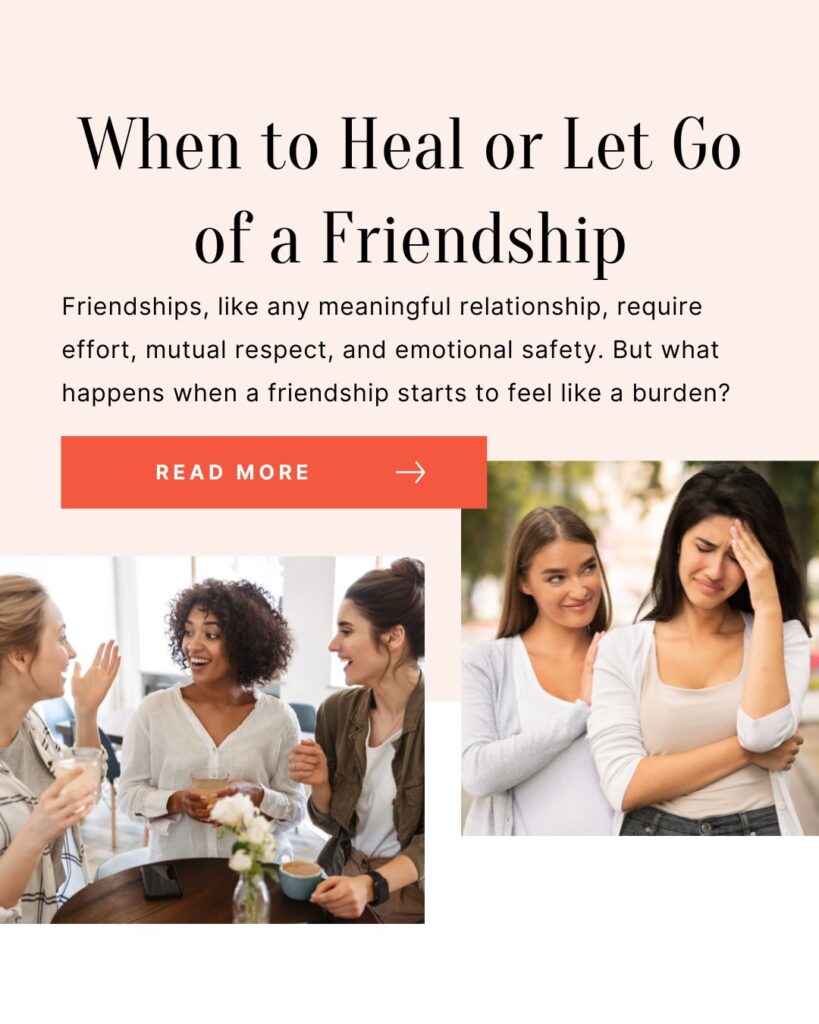True Friendship vs. Fake Support: How to Build a Circle that Lifts You Higher

Friendships, like any meaningful relationship, require effort, mutual respect, and emotional safety. But what happens when a once-close friendship starts to feel more like a burden than a blessing? Whether you’re dealing with a draining connection or trying to recover from a falling-out, knowing how to assess, repair, or release a friendship is a vital life skill.
In this post, we’ll explore:
- How to recognize when a friendship has become toxic
- Practical strategies to mend broken trust
- How to know when it’s time to move on — gracefully and guilt-free
Press Play to Listen to the Episode
The Real Value of True Friendship
Friendship is not just a social luxury — it’s essential for your health and happiness. Research shows that people with strong friendships:
- Live longer
- Manage stress more effectively
- Experience lower levels of anxiety and depression
- Feel supported and understood
However, when a friendship turns toxic, it can create emotional strain, cloud your judgment, and distract you from your personal or professional goals.
Signs It’s Time to Reevaluate a Friendship
If you’re questioning a relationship or feeling worse after spending time with someone, it may be time to assess the dynamic. Common red flags include:
Feeling emotionally drained after interactions
You consistently feel exhausted or discouraged after conversations.
Lack of reciprocity
You do most of the giving — emotionally, mentally, or physically — while your needs go unnoticed or unmet.
Boundary violations
Despite your efforts to communicate your limits, they continue to disrespect your time, space, or privacy.
Undermining behavior
Instead of celebrating your success, they criticize, minimize, or compete with you.
How to Repair a Strained Friendship
Not every conflict means the friendship must end. Many relationships can be restored through honest reflection and respectful communication. Here are a few effective strategies:
Start with self-reflection
Ask yourself: “Have I contributed to the misunderstanding?” Taking ownership of your role helps defuse tension and creates space for accountability on both sides.
Initiate a calm and thoughtful conversation
Here are a few phrases you can use to open the dialogue:
- “I’ve been reflecting on our friendship and would love to talk through something that’s been on my mind.”
- “I value our relationship and want to make sure we’re okay. Can we talk about what happened?”
- “I feel like there’s been some distance between us lately. Can we check in with each other?”
Focus on resolution
Approach the conversation with curiosity, not criticism. The goal is understanding and restoration — not blame or control.
When to Let Go of a Friendship
Sometimes, despite honest efforts, a friendship reaches its natural end. You may come to realize that the person no longer fits into your life in a healthy way. Letting go is not a failure — it’s a form of self-respect. Consider stepping away if:
- The relationship is consistently one-sided, unkind, or emotionally unsafe
- Multiple conversations have been had, but nothing changes
- You feel lighter and more peaceful when there’s distance
Moving on doesn’t require resentment. It simply means recognizing that your emotional well-being is worth protecting.
Final Thoughts: Choose Growth Over Guilt
Letting go of a long-standing friendship can be difficult, but growth often requires release. As we evolve, our relationships must evolve too. You don’t have to hold onto people out of habit, obligation, or fear.
Be intentional. Surround yourself with people who support your growth, honor your boundaries, and celebrate your journey.
Subscribe for More
Want more guidance on building healthier relationships and leading a more balanced life?
Subscribe to the Work It, Live It, Own It newsletter for more insights, podcast episodes, and actionable resources delivered straight to your inbox.
